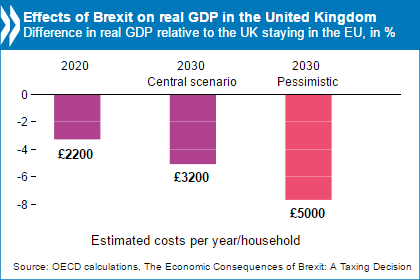Another international organisation has warned Britons that leaving the European Union will be costly. This time it’s the Organisation for Economic Cooperation and Development (OECD). You can read its report if you like. It’s called “The Economic Consequences of Brexit: a Taxing Decision.”
There’s no sense in raging at the impudence of the transnational economic elite. The argument is pretty straightforward. The OECD argues that existing trade relationships between Britain and the EU will have to be renegotiated, plus new ones. That would take years and damage UK GDP to the tune of £2,200 per household.
And that’s a best-case scenario! The “central scenario” says it will cost UK households £3,200 by 2030. And an admittedly “pessimistic” case says the exit tax could be as much as £5,000 per household by 2030.

Leave it to the wonks to put everything in tax terms. But that’s what this really is: a veiled threat of financial punishment if Britain fails to tow the EU line. The threat is couched credibly though. The introduction to the report makes it crystal clear. Lest I be accused of being too dismissive of “credible” arguments, here’s the introduction to the report on what you risk by voting to leave (emphasis added is mine):
The UK would suffer from the loss of unrestricted access to the Single Market. It would also face new barriers in many of the third-country markets to which preferential access was lost as a result of leaving the EU, even if it succeeded in negotiating a new trade arrangement with Europe. An important risk is that capital inflows would be disrupted, leading to a jarring contraction of the UK’s record-high current account deficit of 7% of GDP. A decision by Britain to leave the European Union would cause a severe negative shock to the economy and weaken GDP growth for many years, equivalent to a cost per household of GBP 3200 per year by 2030 at today’s prices, and as much as GBP 5000 in the worst case scenario according the new OECD study. Being outside the EU would further damage trade, foreign direct investment and productivity, according to the study. The longer-term effects of weaker technical progress, migration and capital caused by Brexit are projected according to three scenarios: optimistic, central and pessimistic.
The optimistic case, then, is that it will cost you £2,200 to get out. And that’s not including the long-term damage done to British trade, capital flows, productivity, the quality of pies and the coldness of beer. Got that?
The EU wants the UK in because if Britain leaves others might follow. “Project Fear” is about highlighting a truism: the future is unknowable. Because of that, we have a natural bias to prefer what’s known to what’s unknown.
But if what’s known amounts to membership in a relentlessly centralising, anti-democratic supranational organisation with broad reaching coercive legal powers, £2,200 to get out of it seems like a bargain.

Category: Brexit

